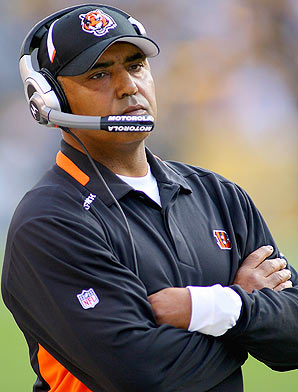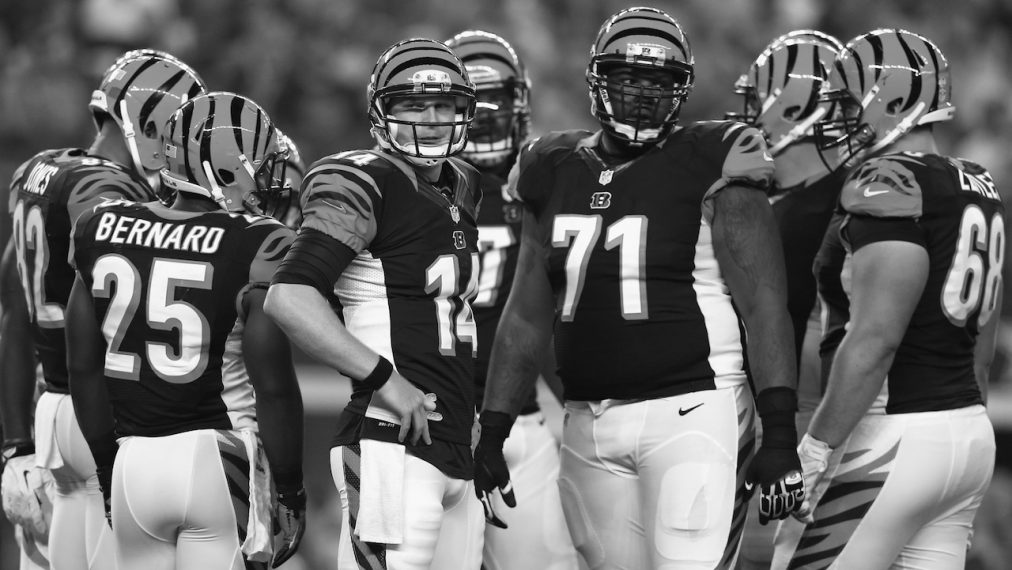How to Lose Even When You Shouldn’t
by Kelly Riggs
“Winning is not a sometime thing; it’s an all time thing.
You don’t win once in a while, you don’t do things right once in a while,
you do them right all the time. Winning is a habit.
Unfortunately, so is losing.”
Vince Lombardi
Strange title for a blog post, huh? Who in the world wants to learn how to lose, even when they shouldn’t lose?? Pretty crazy.
But some organizations do exactly that. They invent new ways to lose. They can’t stand prosperity. At the moment when it appears victory seems likely, they manage to give it all away. As is often said, they can snatch defeat from the jaws of victory.
Let’s consider the Cincinnati Bengals, the team that just suffered a bone-crushing, first-round play-off loss to the Pittsburgh Steelers. It was the very worst kind of loss – one that could have, and should have, been avoided. As much as us football fans say this whenever our fantasy football team falls to defeat, this particular defeat should never have occurred.
First, a quick look at the team:

Bengals coach Marvin Lewis
Marvin Lewis has been the head coach since 2003. Over the past five years, the Bengals have posted a record 52-27-1 and advanced to the play-offs five consecutive times.
This season, they finished a stellar year, winning their division with a 12-4 record, something that many who follow them and get their Online sports betting on accordingly must be thrilled about.
Quarterback Andy Dalton, drafted in 2011, has been the starter since joining the team. This season he finished 2015 with the 5th highest Total QB rating of the season, tossing 25 touchdown passes with only 7 interceptions. Unfortunately, he went down to injury in the 13th game of the season. Enter A.J. McCarron, who complete 67% of his passes, tossed six TDs against only 2 interceptions, and won twice in three starts.
The team’s defense allowed only 17.4 points per game this season, second-best in the NFL, while posting +11 advantage in turnovers for the season, third-best in the league.
On top of all that, the Bengals put five players in the Pro Bowl this season – an offensive tackle, a defensive tackle, a wide receiver, a tight end, and a safety.
Stability. Good quarterback. Strong defense. Talent on both sides of the ball. Five consecutive winning seasons.
And yet, despite all of these positives, the team managed to lose the first play-off game – again.
That is now five consecutive first-round exits for the Bengals, and the seventh first-round loss in seven tries under head coach Marvin Lewis. This is a team that hasn’t won a play-off game since January 6, 1991 – the longest drought in the NFL. Even the hapless Cleveland Browns, the worst team in the NFL since 2000, have won a play-off game since then.
But – and here is the problem – they didn’t so much “lose” the game, as they served it up on a platter and said, “Thanks, but no thanks. You take it.”
With only 1:50 to play in the game, the Bengals took the lead, 16-15. Then, apparently sealing the victory, Cincinnati immediately picked off a Pittsburgh pass and took over at the Steelers’ 26-yard line.
Game over, right?
Not exactly. On the first play from scrimmage, the Bengals fumbled the ball back right back to the Steelers to make it interesting. Still, to everyone except the most die-hard Steelers fan, the game looked well in-hand as Pittsburgh had the ball at their own 9-yard with only 1:23 to play and no time-outs.
Quickly advancing to their own 41-yard line, the Steelers converted a critical 4th-and-3 with a 12-yard pass play to move into Bengals territory. Then, with only 22 seconds left, the Bengals were flagged for a 15-yard pass-interference call that moved the ball to the Steelers’ 32-yard line.
Even worse, on this critical play, the Pittsburgh wide receiver was also injured, resulting in a stoppage in play. During the time-out, Bengals players exchanged words with a Pittsburgh coach and were hit with an additional 15-yard unsportsmanlike conduct penalty.
The result? Instead of a tricky 50-yard field goal, the penalty made the kick a relative chip shot at only 35 yards.
A completely new way to give away a win.
Yes, Leadership Matters
Whether a team succeeds or fails is all up to the leader.
The leader’s attitude sets the tone for the entire team.
The leader drives performance— or doesn’t.
Jocko Willink and Leif Babin
An absolutely crazy story, but what’s the point?
Ironically, there’s a sign in the Bengal’s locker room that goes back to the days of legendary Paul Brown. It says, “The key to winning is poise under stress.”
No kidding.
And instilling poise into the players is the leader’s responsibility. More importantly, veteran players – who serve as leaders on the field as well – shoulder the brunt of the responsibility of keeping their poise under pressure.
Following the heart-breaking loss, some speculated that the job of head coach, Marvin Lewis, might be in danger. Why? A consistent lack of discipline in the players, a problem attributed to Lewis’s failure to address those issues. Even some players acknowledged the problem, as reported in an NFL.com story following the game:
[Bengals DB Adam] Jones conceded, however, that many outsiders would blame Lewis for failing to control his team. And, truth be told, several players inside the Bengals’ locker room — none of whom wanted his name used, for obvious reasons — felt that Lewis deserved the criticism, citing a season-long lack of discipline among some defensive players in games, practices and meetings.
“Eventually,” one player said, “this (expletive) catches up to you.”
Said another: “You put up with enough (expletive) for enough time, guys think they can continually do it.”
Is this an important issue? You bet. Discipline – poise under stress – is absolutely critical to winning. All the talent in the world will be compromised by a lack of discipline. And discipline is a leadership function, pure and simple. It starts with the head coach and extends directly to field leaders as well.
But there’s more.
When leaders fail to own their own mistakes, it is a huge indication that an organization doesn’t have championship mettle. In an interview a day after the game, Bengals CB Adam Jones, the player who earned the unsportsmanlike conduct penalty, deflected the blame for his role in the loss:
“I learned a lot from my actions in that game,” Jones said. “I hurt myself and I hurt the team. But you can’t let one play take away from that I played a hell of a game.”
Jones thinks the blame placed on [LB Vontaze] Burfict is misplaced.
“It doesn’t all come down to that,” Jones said. “That’s what (the media) makes it. Everyone says me and Vontaze lost the game. That game should have been over with. Of course, we have to keep our composure.”
Translation: “Oh, I learned a lot, but it wasn’t really my fault. I played great, and we should’ve won anyway.”
The first sign of weak or ineffective leadership is the deflection of accountability. To be clear, Jones has a point – he did play well, and the Bengals could’ve won if they hadn’t turned the ball over late. But he completely misses the REAL point. As a veteran, and a leader, he should take completely ownership of his critical mistake.
What he should’ve said is simple:
“I failed. I lost my composure, and that is no one’s fault but my own. I made a bad decision, and in the process I let my team mates down. The most important objective for me going forward is to work as hard as I can to learn how to avoid that kind of silly mistake in the future.”
In fact, the perfect example surfaced this past weekend in the Steelers-Broncos game.
Facing the Broncos in the AFC Divisional Play-offs, the Steelers lead in the 4th quarter, 13-12. With 10 minutes to play in the game, and facing a 2nd-and-4 at Denver’s 34-yard line, RB Fitzgerald Toussaint coughs up the ball and kills the Steelers scoring opportunity. The Broncos immediately drive 65 yards in 13 plays for the go-ahead score, and eventually win, 23-16.
Here is Toussaint after the game about his fumble:
“I have to protect the ball. There is no excuse for that,” Toussaint said. “Obviously, [I was] just going over and over in my head how I could have protected the ball a little bit more. They made a great play, so you have to give them credit. In that situation, though, I put it on myself.”
That’s what leadership sounds like. For a leader, being right isn’t the most important thing. Instead, having the attitude and demeanor of a leader is the most important thing. To be otherwise is to fail as a leader.
Now that we’ve thoroughly analyzed these NFL plays and player responses you should know a lot more about how events like these can happen. However, owing to unforeseeable circumstances, it is possible that at times you may not be able to view the entire match. In such cases, if you have a cable TV subscription with one of the Dish TV Packages, you may be able to record the entire game and watch it anytime you want. What more do you need to analyze a game from start to finish? You might even be able to use some of that know-how to pick a good team if you ever place bets on sites like https://ats.io/nfl/. But there’s an important moral for you yourself to learn as well: It’s tough to be a leader. Even tougher to be a great leader. But winning is always a function of leadership – good or bad. If you can’t figure that out then defeat can easily be snatched from the jaws of victory.
In the fantastic book, Extreme Ownership, written by former Navy SEALs Jocko Willink and Leif Babin, the authors emphasize this critical point about leadership:
“Total responsibility for failure is a difficult thing to accept, and taking ownership when things go wrong requires extraordinary humility and courage. But doing just that is an absolute necessity to learning, growing as a leader, and improving a team’s performance.”
It’s tough to be a leader. Even tougher to be a great leader. But winning is always a function of leadership – good or bad.
And one thing is for sure, the Bengals should’ve won that game.
Sadly, from a couple of different perspectives, some of their leaders failed.
Do you think they will learn anything?



